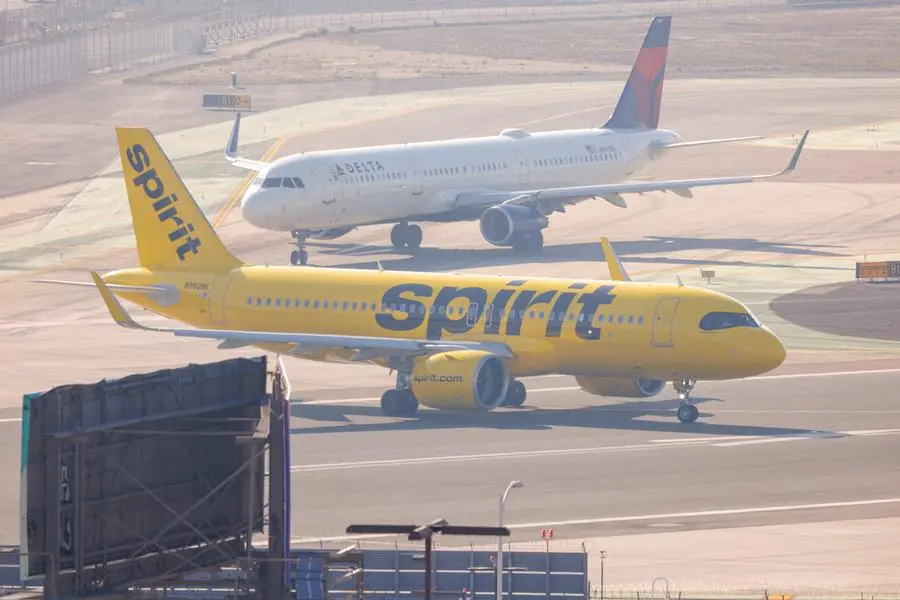PHOTO
CHICAGO - Spirit Airlines faces tough choices about its future including looking for another buyer and finding other ways to shore up its finances after a federal judge on Tuesday blocked its $3.8 billion merger deal with JetBlue Airways, industry experts said.
The ultra low-cost carrier has been struggling to return to sustainable profitability amid rising operating costs and persistent supply-chain problems. That has raised concerns about the company's ability to repay its debt that is due to mature next year.
The airline this month completed a series of sale and leaseback transactions covering dozens of planes in a bid to repay about $465 million of debt on those jets.
But with a recovery in earnings not in sight, some analysts said the company might consider a bankruptcy filing to clean up its balance sheet and reorganize into a financially stronger airline.
Helane Becker, airline analyst at TD Cowen, said Spirit is likely to look for another buyer, but that a more likely scenario is a Chapter 11 filing, followed by a liquidation. She said the recent capital raise has given the company funds to self-finance a potential Chapter 11 filing.
"We recognize this sounds alarmist and harsh," Becker said. "But the reality is we believe there are limited scenarios that enable Spirit to restructure."
The airline is expected to burn cash over the next several years and will have to continue to raise capital to survive, said Conor Cunningham, an analyst at Melius Research.
"The path forward for Spirit turns to survivability," Cunningham said.
Asked to comment, a Spirit spokesperson referred to the company's recent capital raise but did not elaborate. The company had no other immediate comment.
The airline has been among the carriers hardest hit by a snag with RTX's Pratt & Whitney Geared Turbofan (GTF) engines. It is the largest operator of GTF-powered aircraft in the United States.
As a result, it had to ground a number of planes last year. The number of grounded planes is estimated to climb steadily in 2024, from 13 in January to 41 in December.
Meanwhile, excess industry capacity in its key markets is hurting its pricing power, forcing the company to indulge in promotional activity with steep discounting to fill up its planes.
After its third-quarter earnings last October, Florida-based Spirit said it was evaluating its growth profile as it faced softer demand.
Analysts at Seaport Research Partners downgraded the company's shares after the court's ruling, citing "the lack of a credible path to profitability."
Spirit's woes had led to a sell-off in its stock, raising worries about the impact on JetBlue's balance sheet after the merger. With Spirit's shares losing nearly half of their value since JetBlue won its takeover battle, some analysts wondered if that would prompt JetBlue to renegotiate the terms of the deal.
Spirit's shares plunged 47% on Tuesday after the court's ruling, while JetBlue's shares gained about 5%.
Another option would be to find a way to placate the Justice Department's competition concerns created by the JetBlue deal. The judge who presided over the case had at one point questioned whether further asset divestitures would allow the deal to pass muster. But a lawyer for the U.S. Justice Department said the only remedy was "a full-stop injunction that would restore competition."
Analysts also raised the possibility that rival Frontier Airlines, which had lost out in a fierce bidding war, could again make a bid.
Bill Franke, whose airline-focused private equity firm Indigo Partners owns 82% of Frontier, had not ruled out making a fresh bid for Spirit if the transaction with JetBlue failed to close. Frontier declined to comment.
"Spirit has to figure out its Plan C," said Henry Harteveldt, founder of travel consultancy Atmosphere Research Group. "Plan A was to merge with Frontier, Plan B became a merger with JetBlue."
(Reporting by Rajesh Kumar Singh in Chicago Editing by Chris Sanders and Matthew Lewis)





















